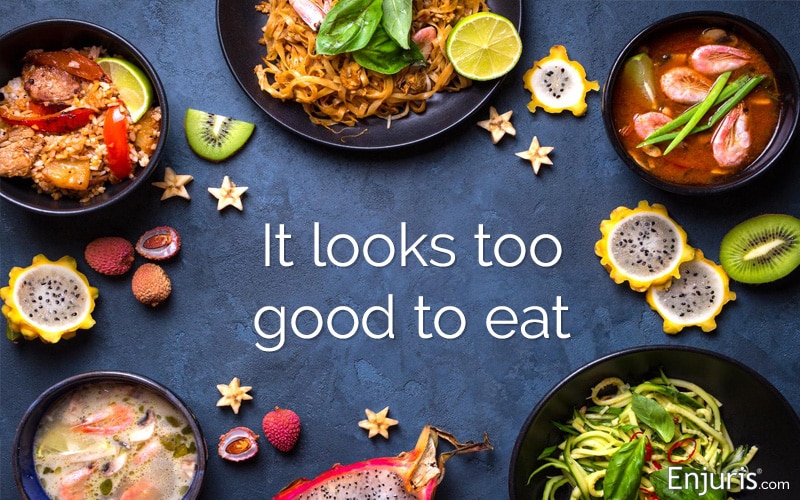
Can you sue the restaurant if you become ill after eating an exotic dish?
Who’s fault is it if you get sick from eating an exotic food? It could be the fault of the restaurant or supplier, if the food handling or preparation was incorrect. But if it just didn’t agree with you… you might be out of luck.
If you're an adventurous eater, you might have tried your fair share of exotic foods. From balut to fugu, these foods can offer a tantalizing taste experience. But what happens when that adventure turns sour, leading to foodborne illness? In this article, we'll explore the legal side of this issue and provide guidance for both restaurant owners and diners.
What's considered 'exotic food'?
Before diving in, understand what qualifies as "exotic food." Generally, this term refers to foods that are not common or familiar to the average diner, that often originate from different cultures or regions.
For example:
- Fugu (pufferfish) from Japan
- Casu Marzu (maggot cheese) from Italy
- Hakarl (fermented shark) from Iceland
- Balut (developing bird embryo) from the Philippines
When exotic becomes hazardous: Cases of foodborne illnesses
Exotic foods, while thrilling to the palate, can sometimes lead to severe health consequences.
The Fugu incident
In Japan, chefs require special licensing to serve fugu because its liver contains a deadly toxin. There have been instances where diners suffered from paralysis or even death after consuming improperly prepared fugu.
Bad balut
In a different case, diners fell ill after consuming contaminated balut. Investigations revealed unsanitary handling and storage practices.
Learn about the 10 most bizarre items diners have encountered in their restaurant dishes, many of which led to bouts of food poisoning.
Who's at fault... restaurants, suppliers, or diners?
When someone gets sick from exotic food, the natural question arises: Who's to blame?
The basis for personal injury law is that a plaintiff (the injured person) is entitled to be made whole, or restored to the financial condition they would be in if the injury hadn’t happened. They can file an insurance claim or lawsuit against the person, business, or other entity that negligently caused the injury.
The key is that the defendant needs to be proven negligent, which means they failed to exercise due care to avoid causing injury or illness to the plaintiff.
The other factor in making a claim for a foodborne illness (or any personal injury) is that it must cost you money. If you fell ill but recovered at home with no medical treatment or financial loss, then you don’t have a financial claim.
There are a few parties who could be liable for the plaintiff’s foodborne illness.
They include:
- The restaurant, if it failed to prepare or store the food correctly.
- The supplier, if it provided contaminated products.
While some might argue that diners "assume the risk" by eating unusual foods, this doesn't necessarily shield restaurants or suppliers from liability. Just because a food is exotic doesn't mean it's inherently dangerous.
Protecting your health and rights: A guide for diners
Reduce your risk of getting sick
- Do your research. Before trying a new dish, do a little homework. How should it be prepared? What should it taste and smell like?
- Ask questions. Don't hesitate to ask the staff about the dish's ingredients, preparation methods, and origin.
- Listen to your gut. If something doesn’t seem right, sending it back or skipping it entirely is okay.
What to do if you become ill from an exotic food
- Seek medical attention. Above all else, seek treatment for your illness.
- Document everything. Save leftovers, take notes of what you ate, and document when you began feeling sick and your symptoms.
- Consult a lawyer. If you believe your illness is due to negligent preparation or handling, it might be time to seek legal guidance.

Sample accident journal/diary to help you document the effect on your daily life
Download in PDF format
How a restaurant owner can minimize liability for an exotic food illness
- Food safety
Train your staff in how to handle exotic ingredients, including avoiding cross-contamination with other ingredients, proper temperature, cleaning, and other food-handling procedures. - Regular inspections
Check the storage and preparation areas for any foods (not just the exotic ones!) for cleanliness and proper handling. - Vet your suppliers
Work with only reputable suppliers and be sure that they meet appropriate health and safety standards.
Transparency with customers
Be honest about ingredients, preparation methods, and any associated risks. Instruct waitstaff that if a customer orders a dish that contains an exotic ingredient, they should point out the ingredient and ask if the customer has questions. Have a chef available to answer questions if the waitstaff cannot.
Encourage and empower any staff member to raise concerns about food safety if they spot a hazard.
What defenses are available to restaurants or suppliers faced with an exotic food-related lawsuit?
- Comparative negligence. This argument suggests that the diner contributed to their illness, perhaps by ignoring warnings or consuming alcohol with the meal.
- Assumption of risk. As mentioned earlier, there's the potential argument that diners knowingly took a risk by consuming an exotic dish.
- Lack of causation. The restaurant or supplier could argue that their food wasn't the cause of the illness, pointing to other foods the diner consumed or some other condition.
Exotic foods can be a delightful exploration of flavors and cultures. However, as with all dining experiences, there's a responsibility on both sides of the plate: Restaurants must prioritize safety, and diners should remain informed. If you believe you've fallen ill due to negligence, don’t hesitate to contact a legal professional. Your health and rights are paramount.
See our guide Choosing a personal injury attorney.

